The study schedule, also called the study plan, is very important to organize the study routine, especially when taking entrance exams, taking Enem or public examinations.
This planning tool makes it easier to achieve goals and objectives in a balanced way, taking into account the limits of each one and the time available.
So, to help all students achieve their goals, check out a step-by-step guide below on how to put together a foolproof study plan. However, remember that it takes a lot of discipline and motivation at this point.
1. make the planning
A study schedule is very personal and should be tailored to each person's needs. Therefore, the goals and objectives that are intended must be consistent with each case.
The person can choose what they should study more, according to their needs or difficulties, or even choose to focus more on a subject that has greater weight in the test they will take. Example:
goals:
- study math and portuguese
- Solve physics and chemistry simulations
- Write 5 essays per week
Goals:
- do well on Enem
- Pass the entrance exam
- Get a place in the public examination
2. gather tasks
To make a study schedule it is necessary to write down all the subjects and tasks that will be included in the plan. Remember not to forget to include rest times (which could be a weekend day).
Also, the time you have is important. So, if there are 3 months of study, the schedule must be made for this period, considering the weekly hours you will need to dedicate to it.
Example:
- Time: 3 months of study (August, September and October) - 12 weeks
- Total of subjects: 10 subjects (Portuguese, Mathematics, Physics, Chemistry, Biology, Arts, History, Geography, Philosophy and Sociology)
3. Define study hours
This part is extremely important and is also very personal, as everyone sleeps or prefers to study at certain times. So, what pays off is adjusting the schedule, taking into account what you'll be able to do.
So don't try to make a fancy syllabus that you won't be able to complete. This will only lower motivation. Below is an example of the study routine until lunchtime:
| Schedule | 2nd Wednesday | Tuesday | wednesday | thursday | friday | Saturday |
|---|---|---|---|---|---|---|
| 7 am | Rise | Rise | Rise | Rise | Rise | Rise |
| 8 am | Math | Math | Math | Math | Math | Math |
| 9 am | Portuguese | Portuguese | Portuguese | Portuguese | Portuguese | Portuguese |
| 10 am | Simulated | Simulated | Simulated | Simulated | Simulated | Simulated |
| 11am | Essay | Essay | Essay | Essay | Essay | Essay |
| 12h | Lunch | Lunch | Lunch | Lunch | Lunch | Lunch |
4. Produce the study calendar
The proposed calendar for the week should be in the chosen study location which should be calm and organized. Thus, printing the calendar weekly helps to follow the proposed schedule.
Of course, the person can choose to manually make the plan on a sheet or in the notebook. Below are some examples of ready-made timelines and some blank templates to print and fill in:
Finished Study Schedules
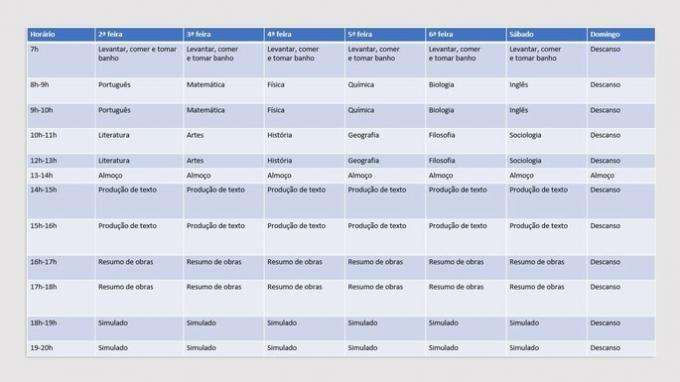
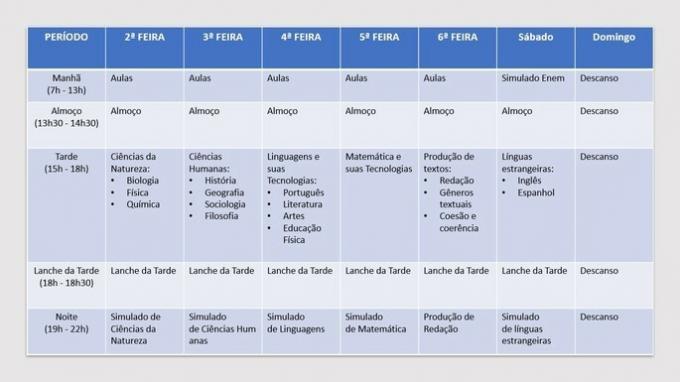
Study schedule templates to print
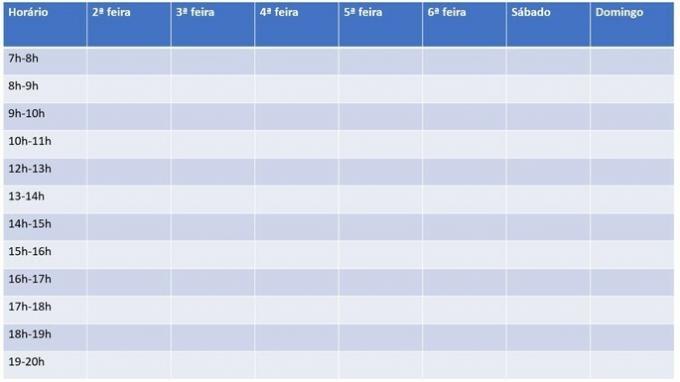

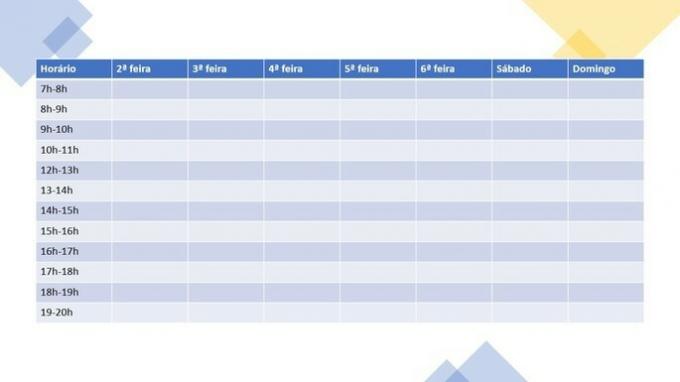
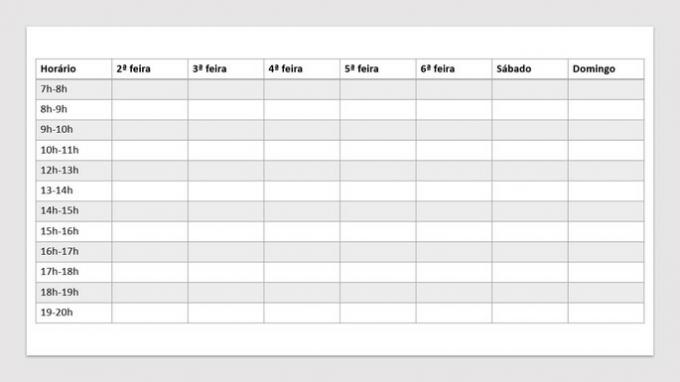
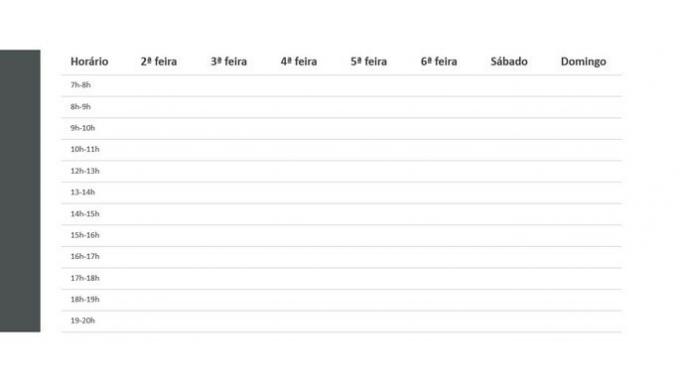
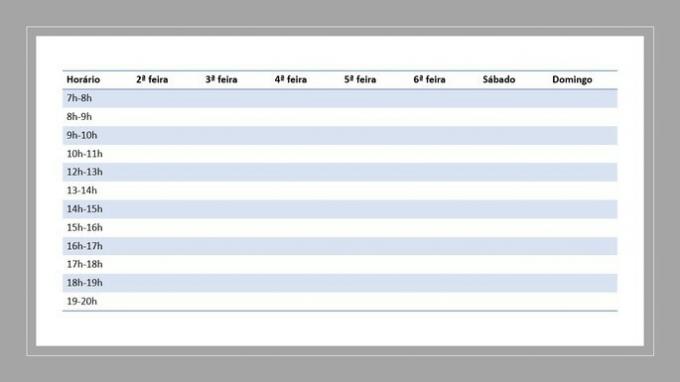
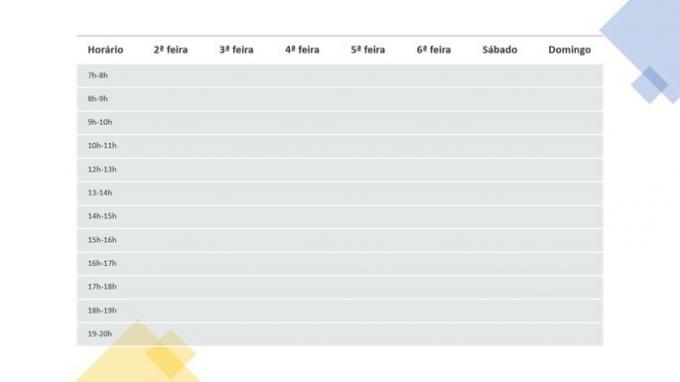

Essential tips to have a better study routine
sleep well every night: there's nothing like a good night's sleep to recover and get your brain ready for the new day.
don't study tired: not worth studying tired. If that's the case, take a break, lie down for a few minutes, or do a meditation.
take breaks during the day: Breaks for walking or stretching are very important and help balance the body and mind. Physical exercises help oxygenate the brain, therefore, they should be part of the daily routine.
Follow the proposed plan: Be sure to follow the plan, however complicated it may be. Studying is not easy, being disciplined even less. But think that this is a fleeting effort and that the achievement will come soon.
If there are changes, redo the plan: unforeseen events happen. So, if there is any change in the routine, the best thing is to redo the schedule.
Don't make a schedule out of your reality: It is important to understand that we must not make a schedule out of our reality and which we cannot meet. This will only increase stress and decrease motivation.
Rest at least one day a week: social life and leisure are important too. Our brain needs rest. Therefore, one day a week should be dedicated to meeting friends, watching movies, going to the beach, playing video games. Avoid thinking about studies that day.
eat well every day: good nutrition is a great ally of the brain. Eating well every day will help you in this endeavor. Therefore, avoid fast food and fatty foods and prefer meals that include vegetables, vegetables and proteins of animal or vegetable origin (meat, fish, soy, etc.).
avoid social media: It is a fact that nowadays we spend a lot of time on social networks and answering messages. However, to focus on study time, turn off everything that can get in the way and distract you from the journey.
Know about this topic:
- Mind map: know how to do yours (with examples)
- Enem study plan

